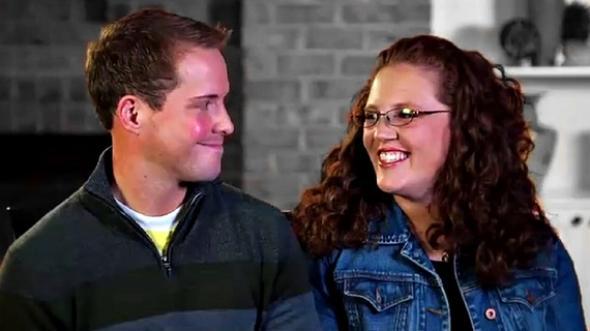You couldn’t stroll onto the gay Internet last week without stumbling over a jeremiad against My Husband’s Not Gay, a typically absurd TLC reality special that follows four Mormon men, three of whom are straight-married and one who is wife-hunting, who distinguish their admitted “same-sex attraction (SSA)” from what they view as a sinful “gay lifestyle.”* In addition to a slew of disapproving op-eds, high-profile LGBTQ advocacy groups like GLAAD denounced the show and a petition calling for its cancelation garnered many thousands of signatures—and this, all before anyone (but a handful of critics) had actually seen the program, which prevailed in airing on Sunday night.
Given that, at least as of the time of writing, the one-hour special has not yet undone a half-century of LGBTQ activism, I feel safe speaking my own truth: I’m glad the hysterical, censorious activism failed. For one thing, because the show produced intelligent, productive writing on the intersection of faith and sexuality and the status of the “ex-gay movement,” like the pieces from Outward contributor Vanessa Vitiello Urquhart, the Atlantic’s Emma Green, and Think Progress’ Zack Ford. But more important, the rush to shut down the show has provided us on the pro-LGBTQ left an opportunity to reflect on what appears to be a startling inability to deal with difference, as well as a worrisome impulse to attribute false consciousness to those who do not live in ways that seem appropriate to us.
To forestall any confusion, the relevant disclaimers: I do not condone “ex-gay” or reparative “therapy” of any sort, nor do I have much interest in religious traditions that terrorize queer people as a matter of doctrine. I tend to think that if a dude is into dudes, he should probably get with dudes.
That said, my experience of watching the program, as I did late last week with my partner and another gay friend, was not the traumatic odyssey of repression and self-deception that all the rending of online garments had portended. Mostly, we found it moderately amusing, pitched as it is in the catty key in which reality shows are generally composed. One of the guys is a total queen, affect-wise, and, given a different context, could probably be made into a charmingly witty dinner party guest. Also, the hot fella danger scale (0 to 4, depending on temptation level) seems ripe for repurposing on the beach this summer, and the delightful incredulity contained in that beanie-hatted gay guy’s flatly stated “Why?” (which he uttered after learning that one of the men wants a wife and kids) will make it an object of study for some time.
But giggles aside, my main reaction to the show was, to be honest, something of a shrug. Over the course of the hour, I did not see an advertisement for ex-gay therapy (despite some of the men’s involvement in related organizations), nor really a suggestion that “curing” homosexuality is even possible. (These men are very clearly still homosexuals, by the strictest definition, in theory if not practice.) What I did see was a model of living and relating to others that felt not only alien, but also pointlessly difficult and inadvisable—and yet, in no way offensive or illegitimate.
We can read all kinds of condescending things into the psychology and motivations of these men (and, for that matter, their wives and dates), but in the final analysis, it’s not really for us to judge the validity of how consenting, informed adults build their lives or pursue happiness: Gays should know better than most where that logic leads. Are these relationships doomed to failure? Maybe! But that could be just as true of any “authentic” gay relationships that these men, in different circumstances, might find themselves in; and in any case, the authenticity of the love between these articulate, seemingly self-aware couples is beyond any outsider’s ability to appraise.
Does the lifestyle presented in My Husband’s Not Gay—one defined by a constant, rather manic cycle of “temptations” anxiously recognized, endlessly processed, and ultimately denied—appeal to me? Absolutely not. But just because I don’t get it doesn’t mean it’s an invalid way of being in the world. By all means, let’s continue to criticize churches that demean queer people and organizations (and quacks and parents) that bully vulnerable queer children. But when it comes to grown individuals who have made different choices about how to live based on their own value systems—choices that are doing no apparent harm to anyone else—let’s keep the infantilizing histrionics to a minimum.
Correction, Jan. 14, 2015: This post originally misstated that all four men on My Husband’s Not Gay were married. Three are married and one is looking for a wife.
